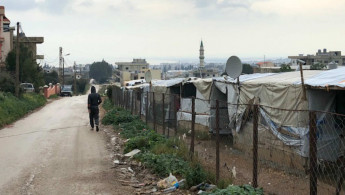Dawn raids on refugee camps 'intended to push Syrians out of Lebanon'
"They arrived at around 5:30 in the morning, with no warning, coming straight to take us from our tents while everyone was still asleep," says Abu Raed, a 56-year-old Syrian from Homs. He is one of the 32 Syrian men arrested by the Lebanese army on Tuesday, February 5, in the al-Anma refugee camp in Bebnine, a town in Akkar, Lebanon's most northern province.
All refugees were released late in the evening, after having spent the day in a prison cell in the army barracks at Qobbe, on the outskirts of Tripoli. "They took us to the checkpoint of Der Ammar first, and from there we were transferred to Qobbe," Abu Raed explains.
The al-Anma refugee camp is one of the largest in northern Lebanon, with nearly 400 tents. "It is very unusual for a camp like this one to exist in Lebanon, as authorities do not allow camps to reach such big sizes," says a community leader who asked to remain anonymous for security reasons. Al-Anma has been the first place of arrival for many families fleeing Syria, especially from the southern Homs countryside, just across the border.
"The army wanted to check our documents and ask us about our status in Lebanon, even if they know perfectly well that most of us do not have the correct documents to be here," complains Abu Raed. According to the UN refugee agency, in 2017 more than 72 percent of Syrians in Lebanon lacked legal residency. Few can afford to pay for a residency permit, and most refugees lack the connections to get a Lebanese citizen to sponsor their stay.
Since 2015, when Lebanon closed its borders after admitting more than a million refugees, the living conditions for Syrians here have been deteriorating. Unable to work or move freely, most refugees can be arrested any time by the Lebanese army, and held for three days before receiving security clearance.
Residents of the al-Anma camp interviewed by The New Arab reported about 20 to 30 soldiers arriving at the camp early on Tuesday morning, and entering without waiting to engage with the camp's authorities. Groups of soldiers went tent by tent waking people up and ordering the men to come out immediately.
A Syrian man was heavily beaten by two soldiers upon reaching the camp's entrance, where refugees were pushed onto army trucks. Witnesses said the man was targeted because he complained about the way soldiers were forcing people out of their tents.
Twitter Post
|
"They entered without warning, flashing their lights in our faces, shouting to get out while throwing all of our stuff on the floor," said one resident. Some tents were searched, and all vehicles and motorbikes owned by the camp's inhabitants were confiscated. "They took 32 of us. They wanted to take more, but they couldn't fit any more people on their trucks."
Abu Raed has been living in the al-Anma refugee camp for nearly five years now. When offered the possibility to be resettled to Australia through the UNHCR resettlement scheme, he and his wife decided to stay in Lebanon, hopeful they would soon return to their hometown in Syria.
"That was back in 2013," he said. "No-one could have imagined the scale of destruction the war could reach.
"All we want now is to leave Lebanon, and find somewhere safe to live. If the UN won't help us travel, perhaps we will try to reach Europe by sea."
Army raids like this are not new in Lebanon. Similar operations have been happening frequently in recent years, mostly targeting Syrian men living in informal settlements. While some raids have been declared necessary for security reasons, many refugees believe such mass arrests are simply arbitrary and used as a wider strategy to slowly push Syrians away from Lebanon.
"No-one new has come to live in this camp for over a year," one resident told The New Arab. "The Lebanese army know perfectly well who lives in this camp, how many children there are, who are the old and sick. How can they still think there are terrorists hiding here?"
Roshan De Stone is a human rights advocate working in Syrian refugee camps in Lebanon. She is a full-time contributor to Brush&Bow.
David L. Suber is a political researcher and journalist. He is directing a documentary on deportations from Europe and currently lives in Lebanon, where he works in refugee camps. David is a full-time contributor to Brush&Bow.


![President Pezeshkian has denounced Israel's attacks on Lebanon [Getty]](/sites/default/files/styles/image_684x385/public/2173482924.jpeg?h=a5f2f23a&itok=q3evVtko)



 Follow the Middle East's top stories in English at The New Arab on Google News
Follow the Middle East's top stories in English at The New Arab on Google News


